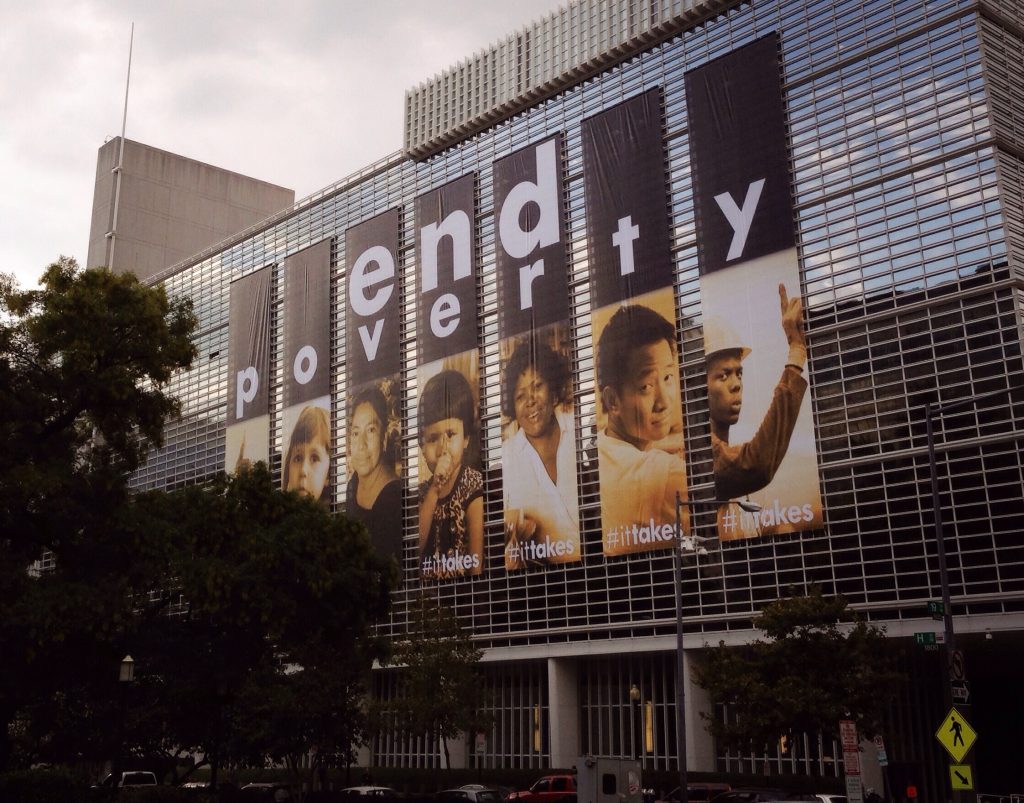Maryam Pashali writes about the World Bank’s empty rhetoric of poverty reduction in our current globalised times, arguing that Western-led ‘development’ is in fact a mask for imperialism

Each year, the capitalist media and supranational neoliberal organisations around the world celebrate the “golden age” of poverty reduction. Supposedly, far less people live in extreme poverty nowadays than in the hundred years before. Equally dubious is the claim that the same economic machinations which have allowed the top 1% to accumulate wealth can help lift the rest of the world from poverty. And to top it all, we must stop focusing our efforts and criticism on the hyper-wealthy and instead explore how the system protected and designed by the same hyper-wealthy can help those less fortunate. In short, clear the way for the Washington-Wall Street-World Bank-IMF alliance to spread imperialist capitalism and force developing economies to re-arrange their systems according to the neoliberal order. This order is enforced through the loans by the World Bank and the IMF, whose funds always come with conditions that erode the self-determination of the receiving states and often damage the people living in these nations – see the disaster of the Sardar Sarovar dam project in India. All while most projects of the World Bank and the IMF are almost always immune from legal consequences.
When the World Bank faced a PR crisis in 2000 as a consequence of stating that global poverty had been getting worse (implicitly as a result of its capitalist acquisition projects in the 1980s), it quickly averted its claims and published a new report in 2004. This report proudly claimed that in the years between 1981 and 2001, 400 million people had been lifted from poverty. The World Bank has successfully been masking both the damage and the futility of its global capitalism by manipulating statistics and shifting its goalposts. This is best observable in the continuous re-definition of the International Poverty Line (IPL). If you earn above the IPL, you are considered to no longer be poor.
By the time the disastrous 2000 report came, the IPL was set by the World Bank at $1.08 a day. In 2000, the IPL was immediately bumped to be $1.02. The number of poor suddenly was suddenly reduced overnight, while nothing material had been done to make that happen. You don’t have to be an economist to see that the income of $1.08 a day cannot guarantee anyone adequate living standards. Later, the IPL was set $1.25 – a number based on dozen of the poorest countries, which are statistically unlikely to be a reliable representation for the rest of the world or even for themselves, since the numbers reported to the World Bank could just as easily be manipulated. For instance, Sri Lanka reported in 1990 that 35% of its population lived below the national poverty line, while in the same year the World Bank reported the statistic to be 4%.
Moreover, when boasting about the reduction of poverty, the World Bank reports China’s success as its own, thereby inflating the achievements. While the World Bank had been hounding the countries of the Global South to open way for western corporations, China had successfully resisted the neoliberal encroachment and lifted millions of people out of poverty. The World Bank had nothing to do with that, and yet it still reports the statistics on Chinese poverty according to its own definitions. The irony cannot be overlooked – if China was so successful in its own right, why does the World Bank even need to continue to exist?
The World Bank must continue to exist because it is a vital tool of economic imperialism. It permits the extraction of wealth from developing countries that have already been ravaged by the brutal colonialism of the past centuries. For instance, each year Africa sees $41 billion extracted from its economy by the various capitalist ventures of the imperialist core (Europe and the US) – projects facilitated by the World Bank and hailed as essential to lifting Africa out of poverty. In fact, the numbers tell a different story. As Global Justice Now reports, “African countries receive around $19 billion in aid in the form of grants but over three times that much ($68 billion) is taken out in capital flight, mainly by multinational companies deliberately misreporting the value of their imports or exports to reduce tax.” Just 101 British companies control African resources worth $1.05 trillion in total. African governments receive very little tax revenues from these western companies, who profit immensely from extracting Africa’s wealth, all while 67% of Africans live on less than $3.10 a day. Trickle-down economics of the neoliberal project obviously does not work.
Global capitalism will never solve poverty and hunger because the profit motive will always be placed above all. Western investment does not care about African, Asian, and South American peoples and their living standards – it is simply interested in maintaining a subservient population that can provide cheap labour. When a company enters a poor African country and offers jobs, it relies on the coercive nature of this labour: either work in yet another dangerous mine or starve to death a month earlier than you would normally.
So what can be done? First of all, supranational organisations and their definition of poverty must be rejected – experts around the world have long been saying just that. Poor countries must be relieved of their debt and the imperialist core must stop its efforts to prevent trade between states that refuse to follow the neoliberal line, such as Venezuela and Cuba. We must recognise that the best solution to poverty is to provide poor countries with no-strings-attached funds (often in the form of colonial reparations) and allow self-determination, instead of celebrating when yet another western company is set up in these states to “create” jobs that might pay a cent above the IPL.
Maryam Pashali



